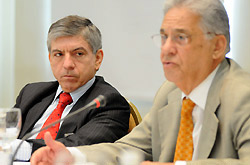What a year! A lot happened in 2009 when it comes to drug policy, much of it good. Last issue we reviewed the international developments. This last week of the year, we take a look at what we see as the ten most important domestic drug policy stories the year brought us.
The war in Afghanistan, the rising tide of drug reform in Latin America, and battles over drug policies in European countries are among the dominant international drug policy stories of 2009. (Reprinted from last week's issue to accompany this week's top ten domestic drug policy stories feature.)
The Mexican military killed a major drug lord last week, but that doesn't seem to have changed anything. The violence continues...
It's a Texas trifecta for Christmas, plus an Alabama jail guard.
Rhode Island approved adding a dispensary system to its medical marijuana program this spring, and now the state Department of Health has promulgated proposed rules to regulate it. But even if all goes well -- and non-controversially -- it could be another year before a dispensary actually starts dispensing.
North Dakota farmers want to grow hemp. North Dakota has licensed them to grow hemp. But are they growing any hemp? No, and a new court decision means its likely to stay that way for the foreseeable future.
Move over NAOMI, here comes SALOME. Just in time for the Winter Olympics, a new heroin maintenance trial is set to get underway early next year in Vancouver.
Bolivian President Evo Morales wants to amend his country's drug law to legalize coca farmers' small holdings and to bring allowed national cultivation limits in line with Bolivian reality. This won't go over well in Washington or with the UN anti-drug bureaucrats.
The State Department's "drugs and thugs" people in charge of Afghan counternarcotics policy aren't doing a very good job, an Inspector General's report has found. Of course, it's tough when you're tasked with Mission Impossible.
Events and quotes of note from this week's drug policy events of years past.
Do you read Drug War Chronicle? If so, we need your feedback to evaluate our work and make the case for Drug War Chronicle to funders. We need donations too.
Apply for an internship at DRCNet and you could spend a semester fighting the good fight!
As 2009 prepares to become history, we look back at the past year's domestic drug policy developments. With the arrival of a highly popular (at least at first) new president, Barack Obama, and Democratic Party control of the levers of power in Congress, the drug reform gridlock that characterized the Bush years is giving way to real change in Washington, albeit not nearly quickly enough. A number of this year's Top 10 domestic drug stories have to do with the new atmospherics in Washington, where they have led, and where they might lead.
But not all of them. Drug reform isn't made just in Washington. Under our federal system, the 50 states and the District of Columbia have at least some ability to set their own courses on drug policy reforms. In some areas, actions in the state legislatures have reflected trends -- for better or worse -- broad enough to earn Top 10 status.
And Washington and the various statehouses notwithstanding, movement on drug reform is not limited to the political class. Legions of activists now in at least their second decade of serious reform work, a mass media that seems to have awakened from its dogmatic slumber about marijuana, a crumbling economy, and a bloody drug war within earshot of the southwestern border have all impacted the national conversation about drug reform and are all pushing politicians from city councilmen to state legislators to US senators to rethink drug prohibition.
For drug reformers, these are interesting times, indeed. Herewith, the Top 10 domestic drug policy stories of 2009:

marijuana plants (photo from US Fish and Wildlife Service via Wikimedia)
Wow. This year has seen the US enter the beginnings of a sea change on policies and attitudes toward the recreational use of marijuana. The first hint that something had changed was the Michael Phelps bong photo non-scandal. When the multiple Olympic gold medal winner got outed for partying like a college student, only one corporate sponsor, fuddy-duddy Kellogg, dumped him, and was hit by a consumer boycott -- and arguably by falling stock prices -- in return. Otherwise, except for a deranged local sheriff who tried fruitlessly to concoct a criminal case against somebody -- anybody! -- over the bong photo, America's collective response basically amounted to "So what?"
Post-Phelps it was as if the flood gates had opened. Where once Drug War Chronicle and a handful of other publications pretty much had the field to ourselves, early this year, the mass media began paying attention. Countless commentaries, editorials and op-eds have graced the pages of newspaper and those short-attention-span segments on the cable news networks, an increasing number of them calling for legalization. The conversation about freeing the weed has gone mainstream.
The sea change is also reflected in poll numbers that, for the first time, this year showed national majorities in favor of legalization. In February, a Zogby poll showed 44% support nationwide -- and 58% in California. By late spring, the figures were generally creeping ever higher. An April Rasmussen poll had support for "taxation and regulation" at 41%, while an ABC News/Washington Post poll found 46% supported "legalizing the possession of small amounts of marijuana for personal use." Also in April, for the first time, a national poll showed majority support for legalization when Zogby showed 52% saying marijuana should be "legal, taxed, and regulated." In July, a CBS News poll had support for legalization at 41%.
In October, a Gallup poll had support for legalization at 44%, the highest ever in a Gallup survey. And a few weeks ago an Angus-Reid poll reported 53% nationwide supported legalization. Legalizing pot may not have clear majority support just yet, but it is on the cusp.
Marijuana law reform was also a topic at statehouses around the country this year, although successes were few and far between. At least six states saw decriminalization bills, but only one passed -- in Maine, which had already decriminalized possession of up to 1.25 ounces. This year's legislation doubled that amount. And then there were legalization bills. Two were introduced in the 2009 session, in California and Massachusetts, and two more have been pre-filed for next year, in New Hampshire and Washington. Both the California and Massachusetts bills got hearings this year, and the California bill is set for another hearing and a first committee vote in the Assembly in two weeks. In Rhode Island, meanwhile, the legislature voted this year to create a commission to study marijuana law reform; it will report at the end of January.
And then, finally, there is the excitement and discussion being generated by at least three separate marijuana legalization initiative campaigns underway in California. Oaksterdam medical marijuana entrepreneur Richard Lee's Tax Cannabis 2010 initiative has already announced it has sufficient signatures to make the ballot. Time will tell if the others make it, but at this point it is almost certain that voters in California will have a chance to say "legalize it" in November.

medical marijuana dispensary, Ventura Blvd., LA (courtesy wikimedia.org)
During his election campaign, President Obama promised to quit siccing the DEA on medical marijuana patients and providers. In February, new Attorney General Eric Holder announced there would be no more federal raids if providers were in compliance with state law, and pretty much held to that promise since then. In October, the Justice Department made it official policy when it issued a policy memo reiterating the administration's stance.
The new "hands off" policy from Washington has not been universally adhered to, nor has it addressed the issue of people currently serving sentences or facing prosecution under Bush administration anti-medical marijuana initiatives, but it has removed a huge looming threat to growers and dispensary operators and it has disarmed a favored (if intensely hypocritical) argument of medical marijuana foes that such laws should not be passed out of fear of what the feds would do.
Meanwhile, California rolls right along as medical marijuana's Wild West. Like countless other localities in the Golden State, the city of Los Angeles is grappling with what to do with its nearly one thousand dispensaries. The issue is being fought city by city and county by county, in the state courts and in the federal courts. And while the politicians argue, dispensary operators are creating political facts on the ground as their tax revenues go into hungry state and local coffers.
This year also marked the emergence of a medical marijuana industry infrastructure -- growers, grow shops, dispensaries, educational facilities, pot docs -- beyond California's borders, most notably in Colorado, where the dispensary scene exploded in the wake of the removal of the federal threat, and in Michigan, where last year's passage of a medical marijuana law has seen the creation of the Midwest's first medical marijuana industry.
While medical marijuana is legal in 13 states (and now, the District of Columbia), it remains difficult to win victories in state legislatures. There were medical marijuana bills in at least 18 states, but only two -- Minnesota and New Hampshire -- were approved by legislatures, and they were vetoed by prohibitionist governors. Bills are, however, still alive in six states -- Delaware, Illinois, New Jersey, New York, Pennsylvania, and Wisconsin -- with New Jersey and Wisconsin apparently best positioned to become the next medical marijuana state. In Rhode Island, which already approved a medical marijuana law in 2007, the legislature this year amended it to include a dispensary system.

salvia leaves (photo courtesy Erowid.org)
Despite evident progress on some drug reform fronts, a substantial number of Americans continue to hold to prohibitionist values, including a number of state legislators. The legislative response to the popularity of the fast-acting, short-lived hallucinogen salvia divinorum is the best indicator of that.
The DEA has been reviewing salvia for five years, and has yet to determine that it needs to become a controlled substance, but that hasn't stopped some legislators from trying to ban it. Appalled by YouTube videos that show young people getting very high, legislators in 13 states have banned or limited sales of the herb.
This year, four more states joined the list. The good news is that legislators in seven other states where salvia ban bills were introduced had better things to do with their time than worry about passing them.

drug testing lab
In another indication that the drug warrior impulse is still alive and well -- as are its class war elements -- legislators in various states this year continued to introduce bills that would mandate suspicionless drug testing of people seeking unemployment, public assistance, or other public benefits. Never mind that Michigan, the only state to pass such a law, saw its efforts thrown out as an unconstitutional search by a federal appeals court several years back.
Such efforts exposed not only public resentment of benefits recipients, but also a certain level of ignorance about the way our society works. A common refrain from supporters was along the lines of "I have to get drug tested for my job, so why shouldn't they have to get drug tested?" Such questioners fail to understand that our system protects us from our government, but not from private employers.
But if welfare drug testing excited some popular support, it also excited opposition, not only on constitutional grounds, but on grounds of cost and elemental fairness. In the four states where drug testing bills were introduced -- Kansas, Louisiana, Missouri and West Virginia -- none of them went anywhere. But even in an era when drug reform is in the air, such bills are a clear sign that there will be many rear-guard battles to fight.

unjust, but also unaffordable
Reeling under the impact of economic downtowns and budget crises, more and more states this year took a second look at drug-related sentencing policies. Most notable of the reforms enacted at the state level this year were reforms in New York's draconian Rockefeller drug laws, which went into effect in October. Under this newest round of Rockefeller drug law reforms, some 1,500 low-level drug offenders will be able to seek sentence reductions, while judges gain some sentencing power from prosecutors, and treatment resources are being beefed up. But still, more than 12,000 will remain in Empire State prisons on Rockefeller drug charges.
New York wasn't the only state to enact sentencing reforms this year. This month, New Jersey legislators passed a bill giving judges the discretion to waive mandatory minimum sentences for some drug offenses. Last month, Rhode Island mandatory minimum reforms went into effect. Earlier this year, Louisiana finally acted to redress the cruel plight of the "heroin lifers," people who had been sentenced to life without parole for heroin possession under an old state law. A new state law cut heroin sentences, but did not address the lifers. As a result, some lifers remained in prison with no hope of parole while more recent heroin offenders came, did their time, and went. Now, under this year's law, the lifers are eligible for parole.
Sentencing reforms are also in the works in a number of other states, from Alabama to California and from Colorado to Michigan. In some cases, reform legislation is in progress; in others, legislators are waiting for commissions to report their findings. In nearly every case, it is bottom-line budget concerns rather than bleeding heart compassion for the incarcerated that is driving the reforms.

PolitickerMD cartoon about the Berwyn Heights raid
It was only one bill in one state, and all it required was reporting by SWAT teams of their activities, but the Maryland SWAT bill passed this year marked the first time a state legislature has moved to rein in aggressive paramilitary-style policing. More precisely, the bill requires all law enforcement agencies that operate SWAT teams to submit monthly reports on their activities, including when and where they are used, and whether the operations result in arrests, seizures or injuries.
In took an ugly incident involving the mayor of a Washington, DC, suburb to make it happen. Marijuana traffickers sent a load of pot to the mayor's address to avoid having police show up on their doorstep in the event something went wrong, but something did go wrong, and police tracked the package. When the mayor innocently carried the package inside on returning home, the SWAT team swooped, manhandling the mayor and his mother-in-law and killing the family's pet dogs. The cops were unapologetic, the mayor was apoplectic, and now Maryland has a SWAT law. A new bill just filed in Maryland would take it further, requiring police to secure a judge's warrant before deploying a SWAT team.

shrine to San Malverde, Mexico's ''narco-saint,'' Culiacan, Sinaloa
While Congress and the Bush administration got serious about Mexico's bloody drug wars in 2008, passing a three-year, $1.4 billion anti-drug aid package for Mexico and Central America, it was not until this year that the prohibition-related violence in Mexico really made the radar north of the border.
It only took about 11,000 deaths (now up to over 16,000) among Mexican drug traffickers, police, soldiers, and innocent bystanders to get the US to pay attention to the havoc being wreaked on the other side of the Rio Grande. But by the spring, Washington was paying attention, and for the first time, one could hear mea culpas coming from the American side. Mexico's drug violence is driven by demand in the US, Secretary of State Hillary Clinton admitted and Homeland Security Secretary Janet Napolitano echoed.
But just because Washington admitted some fault didn't mean it was prepared to try anything different. And while the Mexican drug wars brought talk of legalization -- especially of marijuana -- what they brought in terms of policy was the Southwest Border Counternarcotics Strategy, which is basically mo' better drug war.
Mexico's drug wars show no signs of abating, and the pace of killing has accelerated each year since President Felipe Calderon sent in the army three years ago this month. The success -- or failure -- of his drug war policies may determine Calderon's political future, but it has for the first time concentrated the minds of US policymakers on the consequences of prohibition south of the border.

syringes -- better at the exchange than on the street
After a decade-long struggle, the ban on federal funding for needle exchange programs ended this month with President Obama's signature on an omnibus appropriations bill that included ending the federal ban, as well as a similar ban that applied to the District of Columbia. The bill also removed a ban on the District implementing a medical marijuana law passed by voters in 1998.
Removing the funding ban has been a major goal of harm reduction and public health coalitions, but they had gotten nowhere in the Republican-controlled Congresses of the past decade. What a difference a change of parties makes.

Jim Webb at 2007 incarceration hearing (photo from sentencingproject.org)
The US Congress has been a solid redoubt of prohibitionist sentiment for decades, but this year saw the beginning of cracks in the wall. Two legislators, Rep. Elliot Engel (D-NY) and Sen. Jim Webb (D-VA) introduced and have had hearings on bills that could potentially challenge drug war orthodoxy.
Engel's bill, the Western Hemisphere Drug Policy Commission Act, which has already passed the House, would set up a commission to examine US eradication, interdiction, and other policies in the Western Hemisphere. While Engel is no anti-prohibitionist, any honest commission assessing US drug policy in the Americas is likely to come up with findings that subvert drug war orthodoxy.
Meanwhile, Sen. Webb's National Criminal Justice Commission Act of 2009 comes at the issue from a much more critical perspective. It calls for a top-to-bottom review of a broad range of criminal justice issues, ranging from sentencing to drug laws to gangs and beyond, with an emphasis and costs and efficacy. Webb's bill remains in the Senate Judiciary Committee, but has 35 cosponsors. Webb has already held hearings on the costs of mass incarceration and the economic costs of drug policy, and even more than Engel's bill, the Webb bill has the potential to get at the roots of our flawed national drug policy.

Sen. Durbin at May hearing on crack sentencing
The 100:1 disparity in the quantities of crack needed to earn a mandatory minimum federal prison sentence versus the quantities of powder cocaine needed to earn the same sentence has been egregiously racist in its application, with roughly 90% of all federal crack offenders being non-white, and pressure has been mounting for years to undo it. It hasn't happened yet, but 2009 finally saw some serious progress on the issue.
The move to reform the sentencing disparity got a boost in June, when Attorney General Holder said it had to go. The next month, a House Judiciary Committee subcommittee passed the Fairness in Cocaine Sentencing Act of 2009. The bill is now before the House Judiciary and Energy and Commerce Committees.
On the Senate side, Sen. Dick Durbin (D-IL) introduced a companion bill in October, the Fairness in Sentencing Act. It hasn't moved yet, but thanks to a decade-long effort by a broad range of advocates, all the pieces are now in place for something to happen in this Congress. By the time we get around to the Top 10 of 2010, the end of the crack/powder cocaine sentencing disparity better be one of the big stories.
back to top
In order to accompany this week's top ten US domestic drug policy stories review, we reprint last week's review of the top ten international stories.
As 2009 winds to a close, we review the global year in drug policy. There were a number of events of global significance -- the trend toward decriminalization of drug possession in Europe and Latin America, the slow spread of heroin maintenance therapy, the frontal assault on global prohibitionist orthodoxy at the UN -- as well as new developments in ongoing drug-policy related struggles from the poppy fields of Afghanistan to the cannabis cafes of Amsterdam.
This review can't cover everything -- it's a big world, and there's a lot happening in drug policy these days. Among the items worth at least mentioning in passing: Israel's embrace of medical marijuana, Canada's flirtation with mandatory minimum sentences for marijuana growers (still in process, and amended to be less harmful by the Canadian Senate), the continuing resort to the death penalty for drug offenses in the Middle East and Southeast Asia, the bemusing link between cannabis and schizophrenia apparently at work only in some Commonwealth countries, the Andean drug war (unchanged in its essential outlines this year), and the rise of poor West African nations as favored smugglers' destinations.
What about Mexico? There is one glaring omission here, but there is a reason for that: In the third year of Mexican President Felipe Calderon's offensive against the so-called drug cartels, the violence is more intense and destabilizing than ever. What is happening in Mexico is certainly a drug policy-related phenomenon of global significance, but this year, with more than a billion US dollars in the anti-drug aid pipeline, beefed up border security, official acknowledgement that insatiable American appetites play a crucial role, and growing public and political concern about the violence on the border, we examine the Mexican drug war in the context of US domestic drug policy issues, part of our Top 10 domestic drug policy stories feature.
With that as a caveat, here are this year's biggest global drug policy developments:
Afghanistan: War on Drugs, Meet War on Terror

Afghan opium
Eight years after the US and NATO forces invaded and occupied Afghanistan, driving the Taliban from power, the Taliban have returned with a vengeance, fueled by revenues from the country's primary cash crop: opium. Western estimates of Taliban income from the poppy and heroin trade are in the hundreds of millions of dollars annually, which buys a lot of shiny new weapons for the resurgent insurgents.
This year has been the bloodiest yet for Western occupiers, with 495 US and NATO forces killed this year, according to iCasualties.org. Part of the uptick in violence can be attributed to the Taliban's opium wealth, but the decision by US and NATO forces to move aggressively into the Taliban's eastern and southern heartlands, especially Helmand and Kandahar provinces, has also led to increased fighting and higher casualties.
In June, President Obama, adhering to his election campaign vows if not the wishes of his some of his most ardent supporters, moved to directly confront the drug trade, sending 20,000 troops into Helmand to take on the Taliban and allied traffickers. But while that looked like more of the same, just weeks later, the US announced a major shift in its anti-drug policy in Afghanistan when US envoy Richard Holbrooke announced the US would no longer participate in poppy eradication campaigns. That was a startling, reality-driven break from previous US policy in Afghanistan, as well as with current US policies against coca production in Colombia and Peru.
Instead of persecuting poverty-stricken opium-growing peasants, the US and NATO would concentrate on drug manufacturers and traffickers, but only those linked to the Taliban -- not those linked to the corrupt and illegitimate (after this fall's fraudulent election fiasco) regime of Afghan President Hamid Karzai. The US beefed up the in-country DEA contingent and even came up with a "hit list" of some 50 Afghan traffickers linked to the Taliban.
This fall, fighting has been intense in southern and eastern Afghanistan, as well as across the border in Pakistan, and now, the first of President Obama's promised 30,000-troop escalation is headed precisely for Helmand, where one of its first assignments will be to take and hold a major Taliban trafficking center. The war on drugs and the war on terror will continue to collide in Afghanistan, but now, at least, the imperatives of the war on terror have forced a historic shift in US anti-drug policy, at least in Afghanistan.
Latin American Leaders Call for a Drug Policy Paradigm Shift

Commission panel, former President of Colombia Cesar Gaviria on left (courtesy comunidadsegura.org)
In February, a blue-ribbon panel of Latin American leaders, including former Brazilian President Fernando Henrique Cardoso, former Mexican President Ernesto Zedillo, and former Colombian President Cesar Gaviria issued a report and
statement saying the US-led war on drugs has failed and it is time to consider new policies, particularly treating drug use as a public health matter and decriminalizing marijuana possession.
The report, Drugs and Democracy: Toward a Paradigm Shift, is the work of the Latin American Commission on Drugs and Democracy, which also includes prominent writers Paulo Coelho, Mario Vargas Llosa, Sergio RamÃrez and Tomás Eloy MartÃnez as well as leading scholars, media members and politicians.
Latin America is the leading exporter of both cocaine and marijuana. As such, it has faced the ravages of heavy-handed American anti-drug interventions, such as Plan Colombia and earlier efforts to destroy the Bolivian coca crop, as well as the violence of drug trafficking organizations and politico-military formations of the left and right that have grown wealthy off the black market bonanza. And while the region's level of drug consumption has historically been low, it is on the rise.
"The main reason we organized this commission is because the available evidence indicates the war on drugs is a failed war," said Cardoso at a February press conference in Rio de Janeiro to announce the report. "We need a different paradigm to cope with the problem of drugs. The power of organized crime is undermining the very foundations of democracy in some Latin American countries. We must acknowledge that these policies have failed and we must break the taboo that prevents us from discussing different strategies."

''Global Marijuana Day'' demonstration in Mexico City, May 2008
The report garnered considerable attention, not only in the US and Latin America, but worldwide, and it set the tone for a very reformist year in Latin America.
Mexico Decriminalizes Drug Possession
In May, Mexico decriminalized the possession of small amounts of illicit drugs, including up to five grams of marijuana, a fifth-gram of ecstasy and methamphetamine, a tenth-gram of heroin, and a half-gram of cocaine. The new law closely resembled a 2006 decriminalization bill that had passed the legislature only to die in the face of US protests. There were no US protests this time.
With the Mexican government's action, drug decriminalization has now reached the very borders of the US.
But, according to well-placed observers, the Mexican decriminalization is a case of two steps forward, one step back. In addition to decriminalizing possession of very small amounts of drugs, the new law grants drug enforcement powers to state and local police forces that they never had before. That could mean an increase in the arrests and prosecution of retail-level drug sellers. Still, the long-term political ramifications could be helpful; as one observer noted, "the headline will read that Mexico decriminalized drugs."
Argentina Decriminalizes Marijuana Possession, Laws Against Possessing Other Drugs Tremble

Supreme Court of Argentina
While Mexico decriminalized through the legislative process, Argentina is doing it through the courts. In a series of cases dating back to 2006, Argentine judges have grown increasingly skeptical of arguments for criminalizing drug use.
In the spring, judges in Buenos Aires threw out marijuana cultivation charges against a defendant, saying the plants were for personal use, and the following month, a federal appeals court threw out ecstasy possession charges against a group of defendants, again saying the drugs were for personal use. In both cases, the courts cited a 2006 Argentine Supreme Court ruling that it was the burden of the state "to demonstrate unequivocally that the drugs were not for personal use." In the ecstasy case, the appeals court held that the portion of the country's drug law regarding drug possession must be declared unconstitutional.
In August, the Supreme Court did just that, using another marijuana possession case to rule that the section of the country's drug law that criminalizes drug possession is unconstitutional. While the ruling referred only to marijuana possession, the portion of the law it threw out makes no distinction among drugs.
Imprisoning people absent harm to others violates constitutional protections, a unanimous court held. "Each individual adult is responsible for making decisions freely about their desired lifestyle without state interference," their ruling said. "Private conduct is allowed unless it constitutes a real danger or causes damage to property or the rights of others. The state cannot establish morality."
"It is significant that the ruling was unanimous," said Martin Jelsma, coordinator of the Drugs and Democracy program at the Transnational Institute, which has worked closely with Latin American activists and politicians on drug reform issues. "It confirms the paradigm shift visible throughout the continent, which recognizes that drug use should be treated as a public health matter instead of, as in the past, when all involved, including users, were seen as criminals."
UN's Global Anti-Drug Bureaucracy Meets Organized Resistance

demonstration at the UN drug meeting, Vienna
It wasn't like this a decade ago, the last time the UN General Assembly Special Session on drugs took place. This year, for the first time, the UN's global anti-drug bureaucracy ran into organized resistance when its
Committee on Narcotic Drugs (CND) met in March in Vienna. Not only did a large contingent of drug reform, human rights, and public health NGOs show up to challenge global prohibitionist orthodoxy, they were joined by a number of European and Latin American countries showing serious signs of defecting from the half-century old prohibitionist consensus.
In the end, the CND issued a political statement and plan of action that largely reaffirmed existing prohibitionist policies and ignored harm reduction, but with some victories for reformers both substantive and symbolic. For one, the US delegation finally removed its objection to needle exchanges.
But if the global anti-drug bureaucracies ignored their critics in their report, they were impossible to ignore in Vienna. Demonstrations took place outside the meeting hall, and Bolivian President Evo Morales brandished then chewed coca leaves as he demanded that his country's sacred plant be removed from the list of proscribed substances.
Even UN Office on Drugs and Crime head Antonio Maria Costa was forced to publicly acknowledge the failures and unintended consequences of prohibition. In his address opening the session, Costa bravely argued that "drugs are not harmful because they are controlled; they are controlled because they are harmful," but was forced to concede that prohibition had created a dire situation in some places. "When mafias can buy elections, candidates, political parties, in a word, power, the consequences can only be highly destabilizing" he said. "While ghettoes burn, West Africa is under attack, drug cartels threaten Central America and drug money penetrates bankrupt financial institutions."
All the more reason to challenge prohibitionism and its consequences. After this year, the global anti-drug bureaucracy knows that not only is its long-held consensus under assault, it is beginning to crack.
Czech Republic Decriminalizes Drug Possession, Finally Sets Quantity Limits

Czech marijuana reform demonstration, 2005 (courtesy Michal Vlk)
Following in Portugal's footsteps, authorities in the Czech Republic voted late last year to decriminalize the possession of "smaller than large amounts" of drugs. But that term was vague, leaving its interpretation up to police and prosecutors and resulting in situations where people like personal marijuana growers were being charged as traffickers.
This month, Czech authorities formalized "smaller than large amounts." The new guidelines mean Czechs will suffer neither arrest nor prosecution for up to 15 grams or five marijuana plants, five grams of hashish, 40 magic mushroom segments, five peyote plants, five LSD tablets, four ecstasy tablets, two grams of amphetamine or methamphetamine, 1.5 grams of heroin, five coca plants, or one gram of cocaine.
The new quantity rules go into effect on January 1.
Science vs. Politics in Great Britain
The British Advisory Council on the Misuse of Drugs (ACMD) is an official body charged with providing evidence-based analysis of drug policy issues for the British Home Office. Tensions between the ACMD and the Labor government of Prime Minister Gordon Brown had been on the rise since it rejected the ACMD's recommendation that marijuana, which had been down-scheduled from a Class B to a Class C (least harmful) drug under Brown's predecessor, Tony Blair, remain at Class C. The government instead up-scheduled it back to Class B.

David Nutt
The ACMD was slighted again in February, when it recommended that ecstasy be down-scheduled from Class A (most harmful) to Class B, only to have
the Home Office reject that recommendation the same day. ACMD head Professor David Nutt also drew heated criticism from the Home Office -- as well as Britain's horsey set -- for heretically suggesting that ecstasy was safer than horse-riding. Nutt was forced to apologize for his remarks.
After a relatively quiet summer, the clash between drug science and drug politics exploded anew when Home Secretary Alan Johnson fired Nutt in late October for again criticizing the government's refusal to follow the science-based recommendations of the panel. That firing caused a huge fire storm of protest, including the resignations of at least six ACMD members, and was splashed across newspaper front pages for weeks.
Now, the credibility of the Labor government and its adherence to evidence-based policy-making have been called into serious doubt, as it becomes clear that Home Office drug scheduling decisions are driven by a political calculus, not a scientific one. And if the Home Office thought firing Nutt was going to make him go away, it was sadly mistaken. Nutt is maintaining a high public profile and is vowing to set up his own independent drug panel.
Whither Holland's Cannabis Coffee Shops?

downstairs of a Maastricht coffee shop (courtesy Wikimedia)
This year has seen the long-running battle over the Netherland's famous cannabis coffee shops continue to escalate. Under the Dutch policy of "gedogen," or pragmatic tolerance, marijuana remains technically illegal in Holland, but the sale and possession of small amounts is tolerated and even regulated.
But that tolerant policy is not a favorite of the conservative coalition national government, and it has created a number of problems. "Drug tourism," as the influx of border town marijuana buyers from more repressive neighboring countries is known, has led to everything from traffic jams to public urination to lurking hard-drug peddlers.
And Holland's halfway approach to marijuana policy -- it does not allow for the regulated provision of marijuana to the coffee houses -- has led to the "backdoor problem," in which coffee shop proprietors must rely on criminal-by-definition suppliers to provide them with their product. That provides additional ammunition for the anti-coffee shop crowd.
The conservative coalition government, however, is split on how best to rein in the coffee shops and has promised not to take action at the national level until after the 2010 elections. That has left the field to local authorities, and they have responded.
In March, the "drug tourism" problem resulted in the announcement by the mayors of Roosendaal and Bergen op Zoom that they would close all the coffee shops in their towns by September. In May, the mayors of the eight towns in the border province of Limburg announced coffee shops would be "members only." In August, the Dutch government announced it was providing more than $200,000 for a pilot "members only" program in the border town of Maastricht. Court challenges from coffee shop owners have so far failed to stop any of this.
Meanwhile, in Amsterdam, an urban renewal plan unveiled in May called for a reduction in coffee shops there from 226 to 192, with a 50% reduction in the number of coffee shops in the central Red Light District. But just last week, Amsterdam Mayor Job Cohen fought back, saying that national coffee house policy should not be based solely on border "drug tourism" concerns, that he opposed the "members only" option, and that he rejected a ban on coffee houses within 250 yards of schools.
Holland's marijuana coffee shops have been around for more than 30 years now, but as was made clear this year, they will continue to be a battle front between the forces of Dutch conservatism and Dutch liberal pragmatism.
Heroin Maintenance Continues to Spread

maintenance programs can make heroin addiction cleaner and safer
This year saw a continuation of the slow spread of heroin maintenance programs for severely addicted users unamenable to other forms of drug treatment. At the beginning of the year, permanent or pilot heroin prescription programs were in place in Britain, the Netherlands, Spain, and Switzerland.
Denmark joined the club in February and Germany came aboard in June. These moves come after Switzerland voted in a popular referendum last year to move from a pilot to a permanent heroin maintenance program, based on favorable results from the pilot program.
Canada is about to join the club, too. After the success of the three-year North American Opiate Maintenance Initiative (NAOMI) in Vancouver, Canadian researchers are moving forward with SALOME (the Study to Assess Long-term Opiate Maintenance), a pilot heroin maintenance program set for Vancouver and Montreal. But as of late last month, Montreal's participation was a question mark after Quebec authorities said they would not pay their share of program costs.
Despite lingering political distaste for heroin by prescription, the body of evidence demonstrating its efficacy -- in terms of users' quality of life, public health, and public safety -- continues to grow. There has even been some discussion of bringing a heroin maintenance pilot program to the US. Dr. Peter Reuter, the renowned University of Maryland drug policy expert, authored a study this summer about the possibility of a pilot program in Baltimore.
There is an old saw about not being able to turn an ocean liner on a dime. That's certainly true when it comes to changing drug policies for the better at the national or international level. But each year, it seems that more progress is being made. Let's see what 2010 brings.
back to top
by Bernd Debusmann, Jr.
[Editor's note: Bernd went on holiday Sunday; look for the rest of this week's Mexico news in the next issue of Drug War Chronicle.]

Ciuded Juárez (courtesy Daniel Schwen, Wikimedia)
Mexican drug trafficking organizations make billions each year trafficking illegal drugs into the United States, profiting enormously from the prohibitionist drug policies of the US government. Since Mexican president Felipe Calderon took office in December 2006 and called the armed forces into the fight against the so-called cartels, prohibition-related violence has killed over 16,000 people, with a death toll of over 7,000 so far in 2009. The increasing militarization of the drug war and the arrest of several high-profile drug traffickers have failed to stem the flow of drugs -- or the violence -- whatsoever. The Merida initiative, which provides $1.4 billion over three years for the US to assist the Mexican government with training, equipment and intelligence, has so far failed to make a difference. Here are a few of the latest developments in Mexico's drug war:
Friday , December 18
An assistant soccer coach of Mexico's first division team Indios was killed in Ciudad Juarez. Pedro Picasso, 34, was found dead in a cell phone store along with another unidentified person.
Saturday , December 19
In Nuevo Leon, a high ranking Gulf Cartel member nicknamed "The Korean" was killed, along with five others, after a gun battle with army personnel. Two of the dead were municipal police under the employ of the drug traffickers. The army also seized 616 kilos of marijuana and several weapons, including two assault rifles, from the men.
Additionally, in Sonora, a federal police official in charge of combating retail drug distribution was gunned down in Nogales, and six bodies were found in Puerto Penasco. In other violence across Mexico, four people were killed in Durango, four in Baja California, two in Puebla, and one in Aguas Calientes.
In Ciudad Juarez, four policemen were killed after a series of attacks on patrol cars across the city. In one of the attacks, two brothers who worked for different police agencies but were patrolling together were killed. Two other policemen were wounded in the shootings.
Tuesday , December 22
The family of naval commando Ensign Melquisedet Angulo Cordova, who was killed in the raid that led to the death of drug lord Arturo Beltran-Leyva, was executed in their hometown of Villahermosa. Just hours after the family had returned from an elaborate state funeral for Ensign Argulo, gunmen burst into their home, killing his mother, sister, aunt and brother. Another sister was wounded in the attack.
The following day, four people were arrested in connection with the murders. Two are accused of paying the hitmen, while the other two are accused of acting as lookouts. All four are accused of being members of the Zetas organization, which is allied to the Beltran-Leyva cartel.
In Coahuila, gunmen opened fire on a restaurant with the mayor of a US town inside. Chad Foster, mayor of Eagle Pass, Texas, was dining with Coahuila Attorney General Jesus Torres when gunmen sprayed the restaurant with gunfire. A woman standing outside was killed. Torres was quickly spirited away by security personnel and Foster returned to the US on his own.
Thursday , December 24
In the state of Guerrero, ten bodies were found in two mass graves. Authorities found the bodies after being tipped by an anonymous phone call. Based on the state of the bodies, it appears that the bodies were killed and buried two months ago. Also in Guerrero, seven members of the Beltran-Leyva organization were arrested, including one man suspected in the killing and decapitation of military personnel.
In the town of Tulum, on Mexico's Caribbean coast, a journalist was killed by two gunmen on a motorcycle. Jose Alberto Velazquez Lopez, who owned a magazine and worked for a TV station, was driving to work when he was shot and lost control of his car. Two men were later taken into custody, but released because tests could not determine whether they had discharged firearms or not.
Saturday , December 26
In a 36-hour period, 10 people were killed across Sinaloa. Among the dead were two men who were found bound and executed with shots to the head, and a teenage boy who was killed when a group of gunmen opened fire on a group of people Christmas morning.
Total Body Count since last update: 321
Total Body Count for the Year: 7,598
Read the last Mexico Drug War Update here.
back to top
It's a Texas trifecta for Christmas, plus an Alabama jail guard. Let's get to it:

If we can't keep drugs out of the prisons, how can we keep them out of the country?
In San Antonio,
the FBI is investigating the Bexar County Sheriff's Department's narcotics unit over allegations that some deputies unlawfully took evidence or stole money and property from people they detained or arrested. The probe has been going on for two years and has expanded from allegations of civil rights violations into investigating deputies who appear to be living beyond their means. Among accusations aimed at some members of the dope squad are that they used excessive force and threats and that they shook people down at apartment complexes where they worked private security jobs. The investigation began when a childhood friend of one of the deputies was arrested in Arkansas with 15 pounds of cocaine, and the deputy intervened, filing a report claiming the man was his informant. He wasn't.
In Kerrville, Texas, the former 198th District DA was indicted December 17 for misusing asset forfeiture funds. Former DA Ron Sutton is charged with two counts of misapplication of fiduciary property. The Sutton indictment comes after District Judge Karl Prohl resigned in September after a defense attorney complained to the Texas Commission on Judicial Conduct that Prohl was being biased in the DA's favor because he was benefitting from the DA's largesse with seized funds. Prohl had received $14,500 in checks from Sutton for training, equipment, and to attend a conference, as well as part of another $21,000 check for conferences in Hawaii, and a $6,000 check to cover per diem expenses during those same conferences. As presiding judge, Prohl approved all expenditures from the asset forfeiture fund. Prohl agreed to resign his judgeship "in lieu of disciplinary action" by the commission.
In Lubbock, Texas, a former chief deputy sheriff pleaded guilty December 20 for his role in a methamphetamine trafficking ring. Former Hockley County chief deputy Gordon Bohannon, 53, copped to conspiracy to distribute methamphetamine and now faces up to 10 years in federal prison. He was one of 28 people named in a July indictment alleging a motorcycle gang was running cash to Modesto, California, and returning to West Texas with the speed. Also indicted was another Hockley County deputy, Jose Jesus Quintanilla, who pleaded guilty last month to misprision of a felony. Both deputies provided information to the bikers that hindered efforts to shut down the ring.
In Guntersville, Alabama, a Marshall County jail guard was arrested Wednesday on drug charges. Guard Jeremy Wade Sanders, 32, was being held at his place of employment on charges of marijuana possession, attempt to promote prison contraband, and attempt to commit controlled substance crime.
back to top
Last spring, the Rhode Island legislature approved a bill to allow for the creation of dispensaries for medical marijuana patients. Last week, in response to that legislation, the state Department of Health issued its proposed dispensary rules. A public hearing on the draft is set for February.

Rhode Island patient activist Rhonda O'Donnell, at DC protest
Rhode Island approved the use of medical marijuana in 2007, but that law had no provision for dispensaries for patients unable to grow their own or find caregivers to grow it for them. This year's law allows for up to three nonprofit dispensaries to operate in the state. There are currently about 900 registered patients in the state and about 775 registered caregivers.
State health officials told the Providence Journal that if, after the public hearing, no revisions in the draft were necessary, the new rules could be enacted within 45 days. Then, the licensing process allows for up to 60 days to approve the applications. That brings the timeline to mid-2010, and that's if there are no additional public hearings and no major revisions demanded.
Even after dispensary operators are approved, it will take time to find financing and suitable locations. Once the facility is set up, it will take at least an additional three months before the first medicinal crop can be harvested. It could well be a year before Rhode Island sees a dispensary.
Under the proposed rules, a dispensary is defined as nonprofit entity that "acquires, possesses, cultivates, manufactures, delivers, transfers, transports, supplies, or dispenses marijuana... to registered qualifying patients and their registered primary caregivers."
Patients are limited to 12 plants and 2.5 ounces of usable marijuana. Dispensaries would be able to provide for multiple patients and would be allowed to keep on hand only 12 plants and 2.5 ounces per patient. The dispensaries could not provide a patient with more than 2.5 ounces in any 15-day period.
The proposed regulations do not address what prices dispensaries could charge. Instead, they say only that as licensed caregivers, they would be allowed to be reimbursed for the costs associated with helping a patient.
People complying with the Rhode Island medical marijuana law would be protected from arrest or prosecution, and they could not be penalized by schools, employers, and landlords. Dispensaries could not operate within 500 feet of a school and must have an alarm system.
The proposed rules bar people with drug felonies -- but not other felonies! -- from operating or working for a dispensary, unless their offenses would not be offenses under the Rhode Island medical marijuana law. It also allows the Department of Health to waive that requirement if it wishes.
back to top
The 8th US Circuit Court of Appeals in St. Louis last Tuesday upheld a lower court's decision to dismiss a lawsuit by a pair of North Dakota hemp farmers who argued they should be able to grow hemp crops without fear of federal prosecution.

first North Dakota hemp license signing (agdepartment.com )
Farmers Wayne Hauge and David Monson, who is also a Republican state representative, were awarded licenses from the state department of agriculture to grow hemp three years ago. They sought approval from the Drug Enforcement Administration (DEA), and after the DEA failed to respond, they filed suit in US District Court in Bismarck. There, US District Judge Daniel Hovland dismissed their suit.
The DEA considers hemp to be marijuana. It took a successful federal court challenge to force the DEA to continue to allow for hemp food products to be imported, but American farmers are still forced to stand on the sidelines and watch as their Canadian, Chinese, and European counterparts fill their wallets with profit from hemp sales.
"I guess the next step is we'll have to take it to Congress," Hauge told the Associated Press. "The fastest and easiest way to handle this would be for the president to order the Department of Justice to stand down on all actions against industrial hemp," he added, alluding wistfully to the department's announced policy shift on medical marijuana.
But Congress has other things on its plate, Monson told the AP. "With all the other things, hemp is not high on their priority list, and I can understand that," Monson said. "Somehow, we need to get enough states involved so Congress can take action on it," Monson said.
Adam Eidinger, a spokesman for the industry association VoteHemp, said he was disappointed, but not surprised, by the decision."The 8th Circuit is kind of conservative, so I can't say I'm totally surprised," he said.
No word yet on whether VoteHemp and the farmers will pursue the case any further.
back to top
In the Chronicle's review of the top international drug policy stories of the year last week, the slow spread of heroin maintenance was in the mix. This week, it's back in the news, with word that a new Canadian heroin maintenance study in Vancouver is about to get underway.

Hastings St., on Vancouver's Downtown Eastside (courtesy vandu.org)
The
Study to Assess Longer-term Opioid Medication Effectiveness (SALOME) will choose a Downtown Eastside location next month and begin taking applications from potential participants in February, according to a Tuesday press release from the
Inner Change Foundation, which, along with the Canadian Institutes of Health Research, is funding the trial. With selection of participants supposed to last only three weeks, that means SALOME could be underway by March.
SALOME will enroll 322 hard-core heroin addicts -- they must have been using at least five years and failed other treatments, including methadone maintenance -- in a year-long, two-phase study. During the first phase, half will be given injectable heroin (diacetylmorphine) and half will be given injectable Dilaudid® (hydromorphone). In the second phase, half of the participants will be switched to oral versions of the drug they are using.
The comparison of heroin and Dilaudid® was inspired by unanticipated results from SALOME's forerunner, NAOMI (the North American Opiate Medication Study), which began in Vancouver in 2005 and produced positive results in research reviews last year. In NAOMI, researchers found that participants could not differentiate between heroin and Dilaudid®. The comparison of success rate among injection and oral administration users was inspired by hopes of reducing rates of injection heroin use.
SALOME was also supposed to take place in Montreal, but Quebec provincial authorities effectively killed it there by refusing to fund it. SALOME researchers have announced that it will now proceed in Vancouver alone.
With an estimated 5,000 heroin addicts in the Downtown Eastside and a municipal government that has officially embraced the progressive four pillars approach to problematic drug use -- prevention, treatment, harm reduction, and law enforcement -- Vancouver is most receptive to such ground-breaking research. It is also the home of Insite, North America's only safe injection site.
The NAOMI and SALOME projects are the only heroin maintenance programs to take place in North America. Ongoing or pilot heroin maintenance programs are underway in Britain, Denmark, Germany, the Netherlands, Spain, and Switzerland.
back to top
Bolivian President Evo Morales said Saturday he wants to legalize the small holdings farmers use to grow coca. Morales, who rose to power as the head of a coca growers' union, said he wants to permit farmers to cultivate a coca plot, or cato, of 130 feet by 130 feet.

coca seedlings
Under Bolivia's coca law, Law 1008, farmers can produce up to 30,000 acres of coca nationwide for traditional uses. But the law makes no provision for how much individual farmers can grow.
"We need to achieve a legal market for coca, and because of that, we are rationalizing the cato of coca," he told coca growers in Cochabamba. "It is our obligation to plan how to legalize the cato of coca in the Plurinational Legislative Assembly," Morales said, using the new name for the Bolivian congress.
Morales handily won reelection on December 6 with 64% of the vote, and his Movement Toward Socialism (MAS) holds a two-thirds majority in the assembly. Noting these facts, Morales predicted that the measure will pass.
If it does, it will only add to tensions between Bolivia and the US and between Bolivia and International Narcotics Control Board. In the past year, the US has criticized Morales' policies allowing an increase in coca production, while Bolivia has expelled DEA agents and US Ambassador Philip Goldberg, accusing them of meddling in internal Bolivian affairs. Bolivia under Morales is also demanding that the 1961 UN Single Convention on Narcotic Drugs be amended so that coca is removed from its list of controlled substances.
While the US-sponsored Law 1008 allows for up to 30,000 acres of coca cultivation, the actual area under cultivation this year was nearly three times that, according to the UN. Morales and his supporters argue that amending Law 1008 both to increase the overall legally permitted acreage nationwide and to limit each farmer to one cato will serve to allow more farmers to grow coca without allowing individual farmers to grow so much they can divert it to the black market to be made into cocaine.
Bolivia is the world's third largest coca and producer, behind second place Peru and first place Colombia.
back to top
The US counternarcotics mission in Afghanistan, a key element in Western efforts to defeat the Taliban, is short on long-term strategy, clear objectives, and a plan to hand over responsibility to Afghan authorities, the State Department said in a report released last Wednesday. The report was written by the State Department's Office of the Inspector General.

opium poppies
The department's Bureau of International Narcotics and Law Enforcement Affairs (known colloquially as "drugs and thugs") is responsible for shaping and administering counternarcotics policy in Afghanistan, but it is not doing its job very well, the report said. "The department has not clarified an end state for counternarcotics efforts, engaged in long-term planning or established performance measures," it noted.
With the Taliban making hundreds of millions of dollars a year off the Afghan opium and heroin trade, a smart, effective counternarcotics strategy is critical to US plans to defeat the Taliban by sending in an additional 30,000 troops. There are already 68,000 US and NATO troops in the country, where they have suffered their worst losses so far this year. The number of US military dead in Afghanistan this year sits at 310, exactly double the number killed last year. Overall US and NATO fatalities topped 500 this year, up from 300 last year.
While an effective anti-drug policy may be critical to US plans, it may also be impossible to achieve. As analysts consulted by the Chronicle five years ago -- when opium production was just beginning to reemerge as a problem area -- noted, opium is deeply implicated in the Afghan economy, with more than a million families dependent on it for a living.
"In this case, even if you support drug prohibition in general, the war on drugs is not something we can pursue if we want a rational, effective policy in Afghanistan," said Ted Galen Carpenter, an international affairs analyst for the Cato Institute. "It will undermine everything else we're trying to achieve. The international supply side drug war is complete folly no matter where it is applied, but even if you don't accept that analysis, one ought to be aware that our top priority needs to be going after radical Islamic terrorists, not Afghan farmers," he said.
But heeding the views of the bureau's hard-line drug warriors, the report said that poppy eradication was "essential" to the success of the strategy. But Richard Holbrook, Obama's emissary to the region, abruptly ended the US role in eradication earlier this year, arguing that it served only to alienate poor poppy farmers and drive them into the arms of the Taliban. Instead, Western forces have concentrated on capturing or killing traffickers linked to the Taliban.
Even so, the report found, the bureau had "no clear strategy for transitioning and exiting from counternarcotics programs in Afghanistan." It added that while Afghan contractors working on poppy eradication were meeting agreed-upon goals, vague performance measures in their contracts made it difficult to tell how effective they were.
The report did cut the bureau some slack, noting that it faced tough challenges in Afghanistan, including "a weak justice system, corruption and the lack of political will" in the Afghan government. It also acknowledged the powerful economic incentives for poor Afghan farmers to grow opium poppies.
It recommended setting "a defined end state" for US anti-drug programs, in-country monitoring of contractors, and establishing benchmarks for measuring the Afghan takeover of anti-drug programs.
back to top
December 29, 1988: Judge Mark Polen, in State v. Musika, comments, "There is a pressing need for a more compassionate, humane law which clearly discriminates between the criminal conduct of those who socially abuse chemicals and the legitimate medical needs of seriously ill patients..."
December 30, 1989: Ignoring fhe findings of the agency's own administrative law judge, DEA Director John Lawn orders that cannabis remain on the Schedule I narcotics list, which is reserved for drugs which have no known medical use.
December 28, 1992: ABC Television airs a major special on the drug war in Bolivia which, according to the Bush Administration, is our "best hope" for winning the drug war in South America. ABC concludes decisively that there is no hope and that the war on drug production has already been lost.
December 25, 1994: The Buffalo News reports, "Troubled with three long-term sentences he felt forced to make in recent weeks, US District Judge John T. Curtin says he will stop hearing drug cases in the coming year rather than continue to be part of a system of punishment that 'just isn't working.'" Curtin says he would rather see the federal government spend more money on education, counseling, and drug prevention programs, rather than towards putting people in prison. "You don't even have to think of it in moral terms. In financial terms, it just isn't working," Curtin said.
December 30, 1996: President Clinton approves a plan to combat the new state laws legalizing marijuana for the sick and dying.
December 26, 1997: The San Francisco Chronicle reports that San Francisco Supervisor Gavin Newsom said it is time to treat heroin abuse less as a crime and more like a medical problem. He added that efforts to halt drugs at the border or to "Just Say No" have failed.
December 29, 1997: The New York Times reports that US and Mexican officials said that the United States was providing the Mexican military with extensive covert intelligence support and training for hundreds of its officers to help shape a network of anti-drug troops around the country. The Times points out that "the effort has proceeded despite growing US concern that it may lead to more serious problems of corruption and human rights in one of Mexico's most respected institutions... In fact, a new US intelligence analysis of the military's drug ties will cite evidence of extensive penetration of the officer corps."
December 31, 2000: A Department of Justice report states that state prisons are operating between full capacity and 15% above capacity, while Federal prisons are operating at 31% above capacity.
December 25, 2003: The Philippine Star reports that the campaign to rid the island of drugs by 2010 has resulted in cramming jails and paralyzing the justice system.
December 27, 2004: The Washington Post runs an article about FDA approval of MDMA/cancer anxiety research and the general renewal of research into the therapeutic potential of MDMA and psychedelic compounds.
back to top
Do you read Drug War Chronicle? If so, we'd like to hear from you. DRCNet needs two things:
- We are in between newsletter grants, and that makes our need for donations more pressing. Drug War Chronicle is free to read but not to produce! Click here to make a donation by credit card or PayPal, or to print out a form to send in by mail.
- Please send quotes and reports on how you put our flow of information to work, for use in upcoming grant proposals and letters to funders or potential funders. Do you use DRCNet as a source for public speaking? For letters to the editor? Helping you talk to friends or associates about the issue? Research? For your own edification? Have you changed your mind about any aspects of drug policy since subscribing, or inspired you to get involved in the cause? Do you reprint or repost portions of our bulletins on other lists or in other newsletters? Do you have any criticisms or complaints, or suggestions? We want to hear those too. Please send your response -- one or two sentences would be fine; more is great, too -- email [email protected] or reply to a Chronicle email or use our online comment form. Please let us know if we may reprint your comments, and if so, if we may include your name or if you wish to remain anonymous. IMPORTANT: Even if you have given us this kind of feedback before, we could use your updated feedback now too -- we need to hear from you!
Again, please help us keep Drug War Chronicle alive at this important time! Click here to make a donation online, or send your check or money order to: DRCNet, P.O. Box 18402, Washington, DC 20036. Make your check payable to DRCNet Foundation to make a tax-deductible donation for Drug War Chronicle -- remember if you select one of our member premium gifts that will reduce the portion of your donation that is tax-deductible -- or make a non-deductible donation for our lobbying work -- online or check payable to Drug Reform Coordination Network, same address. We can also accept contributions of stock -- email [email protected] for the necessary info.
back to top
Want to help end the "war on drugs," while earning college credit too? Apply for a StoptheDrugWar.org (DRCNet) internship and you could come join the team and help us fight the fight!
StoptheDrugWar has a strong record of providing substantive work experience to our interns -- you won't spend the summer doing filing or running errands, you will play an integral role in one or more of our exciting programs. Options for work you can do with us include coalition outreach as part of the campaign to rein in the use of SWAT teams, to expand our work to repeal the drug provision of the Higher Education Act to encompass other bad drug laws like the similar provisions in welfare and public housing law; blogosphere/web outreach; media research and outreach; web site work (research, writing, technical); possibly other areas. If you are chosen for an internship, we will strive to match your interests and abilities to whichever area is the best fit for you.
While our internships are unpaid, we will reimburse you for metro fare, and DRCNet is a fun and rewarding place to work. To apply, please send your resume to David Guard at [email protected], and feel free to contact us at (202) 293-8340. We hope to hear from you! Check out our web site at http://stopthedrugwar.org to learn more about our organization.
back to top

























